cello
All scores that include a part for at least one cello.
Bach - Prelude & Fugue - String Quintet
 Prelude and Fugue, WTC Book I, No.22, by J. S. Bach
Prelude and Fugue, WTC Book I, No.22, by J. S. Bach
Transcribed for String Quintet by John W. Pratt, PDF $16.00
Though written for keyboard, this Prelude and Fugue from Book I of Bach's Well-Tempered Clavier is wonderfully adaptable to an instrumental quintet. The Prelude, with its serene harmonic pacing, reveals an almost Schubertian sublime beauty, and the magical counterpoint of the five-part fugue emerges crystal-clear. The challenge for the players, as well as the pleasure, lies in ensemble achievements, not technical difficulties in individual parts.
Score, 6 pages; Parts, 2 pages each, for Violin I, Violin 2, Viola 1, Viola 2, and Cello
with an alternate part for Cello in place of Viola 2; Total, 20 pages.
PreviewBloom - Ablaze She Came in the Dream - Flute, Cello, and Guitar
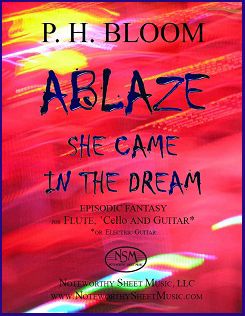 Ablaze She Came in the Dream, by Peter H. Bloom
Ablaze She Came in the Dream, by Peter H. Bloom
Contemporary Composition for Flute, Cello, and Guitar (or Electric Guitar)
Flute, Cello, & Guitar Parts, and Score, PDF $22.97
Ablaze She Came in the Dream by flutist Peter H. Bloom was scored in its original version for flute, viola, and guitar. This intriguing piece comprises eleven brief episodes, which may be repeated any number of times. It is intended to serve as an interpretive vehicle for the performers and thus should be executed freely and expressively. Ablaze received its premier performance in November, 2014, in Boston as part of the Church of the Advent Library Concert Series and featured Mr. Bloom on flute, Frank Grimes on viola, and Anastasiya Dumma on electric guitar.
In the spring of 2016, NSM received a request for a cello version of Ablaze; we complied by creating, in collaboration with the composer, an adaptation for flute, cello, and guitar. Ablaze is not only an exciting piece to hear, it's fun to play as well. Both the viola and cello editions are suitable for adventurous, advanced players. Those wishing to purchase one of our Ablaze editions and then order an additional alternative viola or cello part for a small charge should use the Contact Us form to let us know; we'll make arrangements to accommodate your request.
Score, 23 pages; Flute Part, 11 pages; Guitar Part, 12 pages; Cello Part, 12 pages; Total, 66 pages.
PreviewFoster - Old Folks; Oh! Susanna - Vo/Pf/Fl/Vc
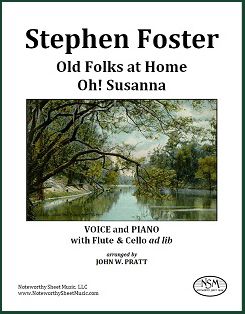 Old Folks at Home and Oh! Susanna, by Stephen Foster
Old Folks at Home and Oh! Susanna, by Stephen Foster
Arranged with Flute and Cello ad lib by John W. Pratt
Flute Parts, Cello Parts, Voice Parts, and Piano Scores ― PDF $7.99
The following excerpts are taken from John W. Pratt's foreword to the edition:When a Golden Oldie comes to mind, Doo-dah! Doo-dah!
Comic, sad, or any kind, Oh! Doo-dah-day!
Jeanie, Swanee, Kentucky, Joe, Doo-dah! Doo-dah!
Beautiful, dreamy, fast, or slow, Oh! Doo-dah-day!
I'll bet I know who wrote it, he wrote them night and day,
Stephen Foster wrote it, he'll never go away.
Stephen Foster was born in Lawrenceville, Pa., on July 4, 1826...He wrote over 200 songs, including 135 parlor songs, 28 minstrel songs, and 21 hymns and Sunday school songs. A remarkable number are memorable, as the ditty above will attest to anyone with anything like my background. One wonders why. The harmonies and rhythms are basic, as are the forms and rhyme schemes (see above), the music is repetitious, and the vocal range rarely goes outside an octave (a great benefit for community singing). Yet the fit is so natural and the pacing so well judged that the songs are ideally effective and diabolically catchy. Foster is perhaps, though on a different plane, the Mozart of his field...
For a pianist playing several stanzas at a sing-along, Foster's songs do become a little dull. But their very simplicity, repetitiousness, and familiarity abet variation as, again on a different plane, chorales serve Bach chorale preludes. Like chorale preludes, the piano parts here always incorporate the melody, so they can be played solo or to accompany amateur singers. It struck me that they could be enhanced by optional flute parts. After writing them, I discovered that, according to his brother Morrison, Foster himself "delighted in playing accompaniments on the flute...As the song went on he would improvise...the most beautiful variations upon its musical theme." If Foster's improvisations were like the one his brother published, however, they just varied the melody itself in the manner of the period. My game is more ambitious, as you will easily see. I added optional cello parts, mostly for color, as in the Haydn trios but superficially more interesting for the cellist. (Again we are on a different plane, of course.)
"Oh! Susanna," one of the best-known American songs by anybody, is Foster's "Erlkönig." (Speak of different planes!) With its nonsensical lyrics and polka beat, it is clearly comical, and I treated it accordingly. It was written in Cincinnati, possibly for a social club, first performed at an ice cream saloon in Pittsburgh in 1847, and published in 1848. When no American song had sold over 5,000 copies, it sold over 100,000. It earned Foster only $100, but its popularity led to a publisher's offer, convincing him to become a professional songwriter, America's first.
"Old Folks at Home" established Foster as a truly American composer. It was written in 1851 for a blackface troupe whose leader paid Foster about $15 to be credited for it. When almost finished, Foster asked his brother for "a good name of two syllables for a Southern river." He rejected Yazoo and Pedee, but was delighted with Swanee, a shortening of Suwanee, a small river in Florida which his brother found in an atlas. Though about a slave's nostalgia for home, I find its theme universal and melancholy and I resisted the temptation to jazz it up. Please try, at least, a slowish tempo.
― John W. Pratt, May 27, 2013 ©
Flute parts, 2 pages; Cello parts, 2 pages; Voice parts, 2 pages; Scores, 7 pages; Total, 18 pages.
PreviewSchnauber - A Little Grand Wedding March Waltz - Piccolo and Trombone
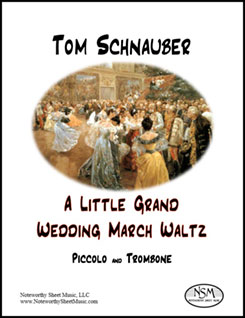 A Little Grand Wedding March Waltz, by Tom Schnauber
A Little Grand Wedding March Waltz, by Tom Schnauber
Score for Piccolo and Trombone, PDF $4.99
This piece was written for the wedding of two good friends of mine from graduate school. One was a trombonist and the other a piccolo specialist. It was conceived in the lovely tradition of Hausmusik: short, simple, fun, and meant for two people to play with each other or for friends. Also, though the score indicates trombone and piccolo, it should be equally satisfying with a cello or bassoon on the lower part and a standard flute on the upper. Or even contrabassoon and piccolo . . . whatever you have available. —Tom Schnauber
Score, 3 pages; Total, 4 pages
PreviewSchubert - Erlking - Flute, Cello & Piano
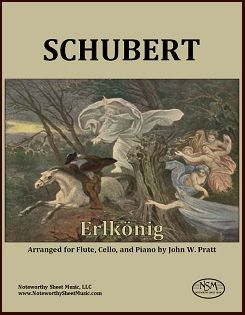 Erlkönig, Franz Schubert
Erlkönig, Franz Schubert
Arranged for Flute, Cello, and Piano by John W. Pratt
Piano Score and Parts for Flute and Cello; PDF $11.99
Franz Schubert (1797-1828), inspired by reading Goethe's poem, wrote his song "Erlkönig" in a few hours in 1815. The song was an immediate hit, and continues to be popular to the present day. Numerous transcriptions have been prepared, but surprisingly none that we found for flute, cello, and piano. John Pratt has created such a trio arrangement, listed here, and also a duet version of the piece with Schubert's solo part adopted without change but with a less punishing alternative to Schubert's piano accompaniment.
Excerpted from Mr. Pratt's © preface:
"In the trio arrangement, the flute provides a natural voice for the child and for the mysterious Erlking, whose words are in the child's head. The cello makes a natural father. The narration is mostly given to the cello also, but the flute takes over when the child is mentioned in bars MM 24-30, and joins the cello when the ride is ending in anguish and distress (MM 139-145). The piano is treated as a member of a trio rather than an accompaniment to a voice singing words. The presence of the cello helps free the piano from the constant pounding and allows it to employ a wider range of expressive sonorities than Schubert's, befitting the absence of words. One might view the result as a kind of tone poem."
Preview
Schubert – Erlking – Duo (Vo, Vc, Va, or Afl with Pf)
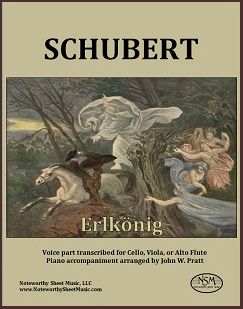 Erlkönig, by Franz Schubert
Erlkönig, by Franz Schubert
Arranged for Cello (or Viola or Alto Flute) and Piano by John W. Pratt
Piano Score and Parts for Cello/Voice, Viola, and Alto Flute; PDF $11.99
Franz Schubert (1797-1828), inspired by reading Goethe's poem, wrote his song "Erlkönig" in a few hours in 1815. The song was an immediate hit, and continues to be popular to the present day. John Pratt has created a trio arrangement for flute, cello, and piano (click for more information), and also the duo version offered here with Schubert's solo voice part transposed for cello (or viola or alto flute), and with a less arduous alternative to Schubert's piano accompaniment.
Excerpted from Mr. Pratt's © preface:
"In the duo arrangement, Schubert's solo part is adopted without change. Thus the piano must provide the entire accompaniment, but rocking triplets and other pianistically felicitous passagework replace Schubert's unremitting repetition. The range of sonorities is also wider than Schubert's, though more restrained than that of the trio arrangement, where the flute enlarges the musical terrain. This accompaniment is offered as a less punishing alternative to Schubert's, to be played with a singer or any solo instrument. Solo parts are provided for voice or cello, viola, and alto flute."
Piano score, 6 pages; Cello, Viola, and Alto Flute parts, 2 pages each; Total, 22 pages.
Preview